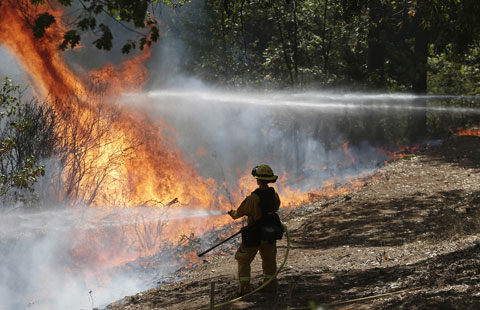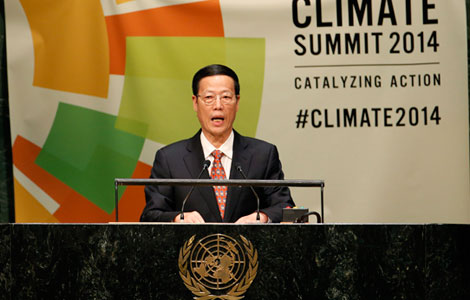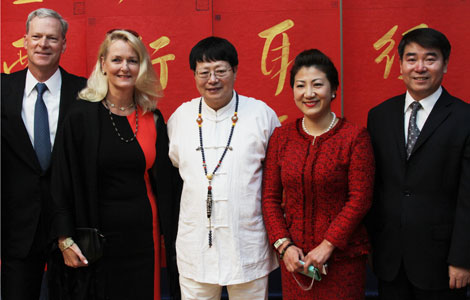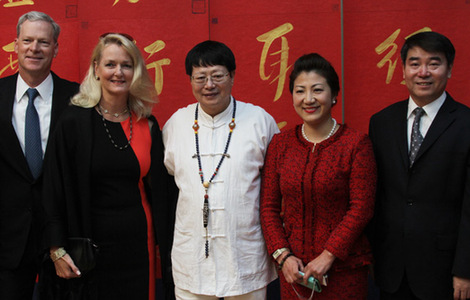High alert
Updated: 2014-09-25 07:10
By Cui Jia(China Daily)
|
||||||||
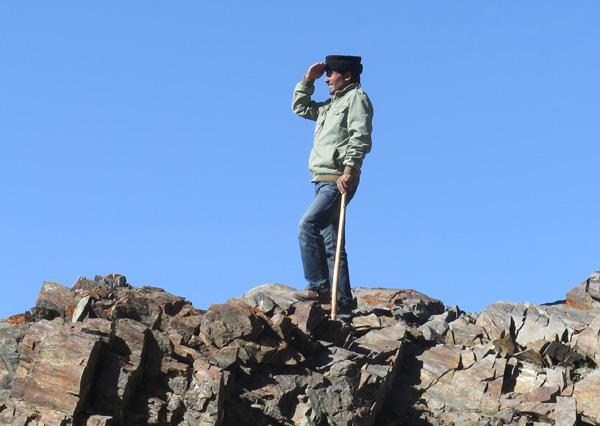 |
|
A Tajik herdsman helps troops patrol an area along the border. The Tajik people play an important role in providing valuable information about suspicious activities. CUI JIA/CHINA DAILY |
Half of the appointed patrol areas of Mingtiegai company are in mountainous areas above 4,000 meters with no roads. The soldiers have to ride horses and yaks in the winter, Tang said.
All companies have stables and the horses come from a military base. Most of them are Ili horses-a Xinjiang breed adapted to the high-altitude environment that can endure long distances.
Sometimes, it may take more than a week for the troops and their "war horses" to reach and return from the checkpoints at altitudes of 5,000 meters. Even during the summer months on the Pamir Plateau, climbing over snow-covered mountains and glaciers are something the soldiers have to deal with.
"The horses are fellow soldiers and they are very smart. They are miserable when we ride them to assigned checkpoints because they know it is very tiring. When we head back, you can tell that they are so happy to go home and they know the way," Tang said while grooming his horse "big red".
Liu Jianmin, 30, commander of the Kalaqigu company in the corridor, was busy preparing the horses for a routine patrol starting the next day.
"We patrol more frequently now. Even the horses have lost weight."
Kalaqigu means "black hole" in the Kyrgyz language because the area always experiences strong winds. It is on the east side of the Wakhan Corridor and just off the road to Khunjerab, the land port between China and Pakistan.
Huang Xiaoming, commander of the PLA's Khunjerab company, was busy analyzing images taken by the high-definition surveillance cameras on the mountain passes leading to Pakistan. He zoomed in to check a man on a horse heading to one of the passes.
"It's just a local herdsman. Nothing to worry about, " he said.
Power supply
After power lines were connected to the company's headquarters and frontier defense stations in July, the troops could monitor the border areas 24 hours a day without being worried about unstable power supplies from the solar panels.
Previously, the company's base was powered by solar panels and a diesel engine. When it snowed, little electricity was generated. Electricity is essential, if surveillance cameras are to monitor suspicious activities, and it will improve the troops' ability to catch terrorists or separatists trying to cross the border illegally.
Huang said some tribal terrorist cells in Afghanistan remain active near the Wakhan Corridor, posing a big threat to China, which has experienced a series of terrorist attacks.
Some separatists and terrorists who plotted attacks in Xinjiang were also trained in Pakistan and Afghanistan.
According to the State Grid, the electricity supply will be connected to the corridor later this year.
"The patrols are still the most effective way to detect abnormal border activities because we can track footsteps and find burnt wood, which terrorists could have used to make fires," Huang said.
One of the frontier defense stations of Huang's company is near the Khunjerab boundary marker, at an altitude of 5,200 meters. An inspection station of the border defense forces that belongs to the Ministry of Public Security mainly carries out inspections on people and goods passing the Khunjerab land port.
Xu Shichuang, 29, has been an inspection officer at Khunjerab for 10 years. He has learned to speak Urdu, the official language of Pakistan, to communicate better with Pakistani travelers.
"It's a tough job just to be at such high altitudes. I also have to make sure no drugs or weapons get pass me. I won't forgive myself if one bullet is smuggled in because that could cause someone's life," Xu said.
The station also stepped up searches for books or other material containing information on religious extremism, as its spread has led to more terrorist attacks in Xinjiang.
Xu watched an eagle hovering in the valley near the inspection station during his short break and took a deep breath to inhale as much of the precious thin air as possible.
As Xu returned to work, Lu Duobin, deputy head of the station, was having a meeting with Syed Akbar Rizvi, inspector of the Pakistani police's Khunjerab Security Force, whose logo is an ibex-a common animal in Khunjerab. Chinese inspection officers have also spotted snow leopards in nearby mountains.
They were discussing how to locate and return the Pakistani herdsmen's missing yaks that were likely to have wandered into China. Rizvi said the herdsman was worried because the yaks are valuable assets to the family.
"Exchanging missing yaks and sheep is actually one of our important jobs. We see it as illegal crossing too. It's an international diplomatic issue," Lu said firmly.
Of course, anti-terrorism cooperation is the two border forces' top priority, and sharing intelligence is critical, Rizvi said.
"As Chinese border defense forces are very strong at Khunjerab, we rarely see terrorist activities. Near the Pakistan and Afghanistan border the Taliban is still quite active, so we launched an attack in June and killed three main leaders in the area. Such information is important to China too," he said.
The KSF has a station about 1 km off the Khunjerab boundary marker. Sergeant Ashzaq Hussain has been working at Khunjerab for more than 10 years.
"The Chinese border defense officers are not just friends to us. We are brothers and so are Chinese and Pakistani people," Hussain said.
"We know the pain brought by terrorist attacks and we won't let terrorists or separatists enter China to ruin the lives of our brothers."
Contact the writer at cuijia@chidaily.com.cn
Most Viewed
Editor's Picks

|

|

|

|

|

|
Today's Top News
Obama urges further coalition efforts against IS
China boosts climate efforts
Central Asian nations are ready to roll on the 'new Silk Road'
Ex-Chinese planning official confesses to graft
Alibaba's shares down for second day
Emissions report tells only part of story, expert says
Xi reassures HK on stability issue
Obama, Zhang meet at UN
US Weekly

|

|


